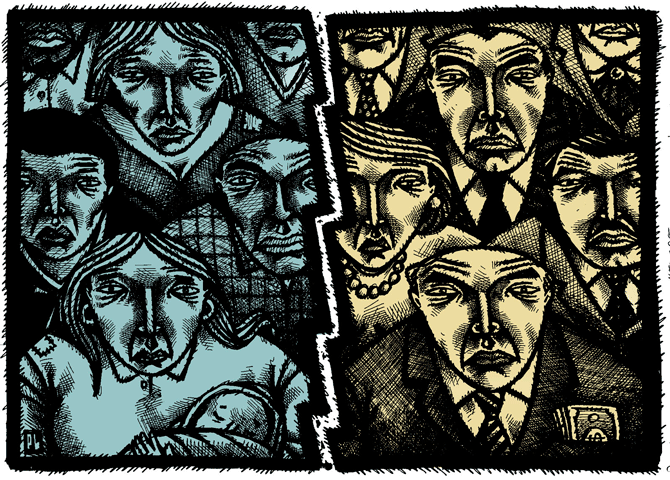
(Paul Lachine)
Nothing angers conservative Americans more than seeing a poor person wearing expensive tennis shoes, smoking cigarettes or spending their food stamps on junk food.
Why don't they just eat healthier, shop smarter and save their money to get themselves out of poverty? You know, like we would probably do?
The simplistic answer that "they don't pull themselves up by their bootstraps because they don't have any boots" doesn't adequately explain why poverty is so persistent.
But a recent blog post by a mother of two with two jobs does a great job of illuminating "why poor people's bad decisions make perfect sense." In it, Linda Tirado gives an insider's look at what it's like to be a member of America's underclass. What comes through most is the depression, exhaustion and utter lack of hope.
"You have to understand that we know that we will never not feel tired. We will never feel hopeful. We will never get a vacation. Ever. We know that the very act of being poor guarantees that we will never not be poor," she writes.
Smoking, Tirado explains, works as a stimulant to ward off the exhaustion: "When I am enraged and beaten down and incapable of accomplishing one more thing, I can smoke and I feel a little better, just for a minute. It is the only relaxation I am allowed."
Why so much convenience food? Dollar frozen burritos are cheap, and cooking attracts roaches. "It makes more sense to get food that you know will be palatable and cheap and that keeps well," she explains. "Junk food is a pleasure that we are allowed to have; why would we give that up? We have very few of them."
Poverty, especially entrenched, persistent poverty, destroys any sense of planning or long-term vision. It's all about surviving day to day.
"We have learned not to try too hard to be middle-class," Tirado writes. "It never works out well and always makes you feel worse for having tried and failed yet again. Better not to try."
Much of Tirado's essay rang true to me, since -- because of my own poor decisions -- I spent about a year living in poverty when I was younger. I eventually "pulled myself out of it," though I should say "we," since I couldn't have done it without a number of wonderful support services.
Tirado's story (drawn from her own experiences plus observations of others) certainly struck a chord across the Internet, now having been viewed by millions. So many people responded with offers of help that she set up a go fundme.com site where people can donate so she can quit one of her jobs and write a book. It raised almost $62,000.
I was heartened but also a little surprised by the response. Isn't this the same country that just voted to cut food assistance to poor families like hers? That wants to put all kinds of restrictions on welfare recipients, from drug testing to work requirements to children's school attendance?
Why the generosity, when she's clearly not promising to become an upstanding middle-class American immediately?
I believe it's because, to readers of her blog post, Tirado is now a real person with a real story. For many of us, that's about as close as we get to getting to know a real poor person. The New York Times' recent series on homeless children, likewise, is introducing middle- and upper-class folks to "invisible" children like Dasani, the subject of that five-part series.
The gap between rich and poor in this country is widening, but it's not just about income. Most of America's educated and wealthier folks never experience or are even exposed to broader American culture, especially lower-class culture.
One author calls it "living in a bubble."
In his 2012 book Coming Apart: The State of White America, 1960-2010, political scientist Charles Murray (from the conservative American Enterprise Institute, no less) argues that U.S. society is highly classist and is literally "coming apart" at the seams.
Do you live in a bubble? Find out with this handy online quiz that asks about everything from whether you've ever bought Avon cosmetics, walked a factory floor or can identify military insignia. The most telling question: "Do you now have a close friend with whom you have strong and wide-ranging political disagreements -- not counting disagreements on the same side of the political spectrum?"
If you're a little too "bubbly," perhaps a good New Year's resolution might be to give it a pop.
[Heidi Schlumpf teaches communication at Aurora University outside Chicago. Her "bubble" score is 42.]




